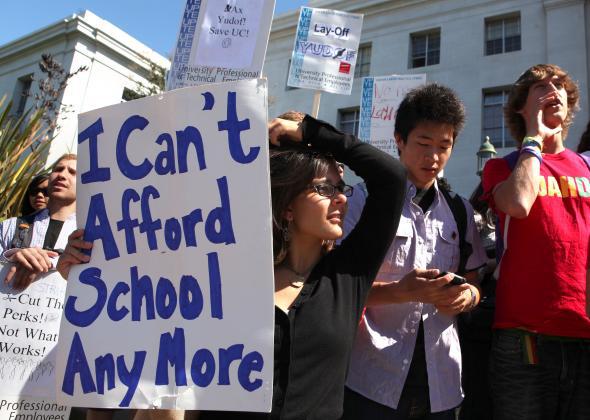When you think of the funding shortfalls in the once-majestic University of California system, you might think of “gigantic” tuition increases or the system’s only observatory being defunded. But what you probably didn’t know is that, according to the regents, one of the “injustices” in the 10-campus system is the embarrassingly low pay of its three “worst”-paid chancellors, all of whom take in more than $300,000 per year. This comes on the heels of a report by the system’s finance executives that, according to the San Francisco Chronicle, years of budget crises have meant that “UC lacks the funds to keep the student-faculty ratio from rising, replace aging technology,” and “close salary gaps for faculty and staff.” But comfort yourselves in the knowledge that every chancellor in California has been raised from the depths of pretty rich to really quite rich.
In a regents-wide vote—opposed only by the valiant lieutenant governor Gavin Newsom, perhaps via Skype from the saddest office in the world—20 percent raises were granted to UC-Santa Cruz chancellor George Blumenthal (from $319,300 to $383,160), UC–Merced chancellor Dorothy Leland (also $319,300 to $383,160), and UC–Santa Barbara Chancellor Harry Yang ($324,450 to $389,340).*
This, according to regent Russell Gould, was a matter of “correcting injustices.” UC chancellor pay—despite looking like a hell of a lot of money—is among the lowest in the nation. Such an injustice is, apparently, what sent Michael Drake from my alma mater UC–Irvine to the scarlet embrace of Ohio State, where he was offered a base salary of $851,303. (In Drake’s defense, that slary is less than a third of what his predecessor, the bowtie-wearing off-color joke-maker E. Gordon Gee, pulled in—before being bought out in disgrace.)
So is rectifying an existing disparity such a poor use of the UC budget? Well, at this point we should probably hand it to the system for refusing to turn their campuses into water parks. Actually, though, some universities are installing “lazy rivers” and other recreational amusements for the same reason that they’re paying their administrators like CEOs: The university has become a “business” with “customers” that used to be thought of as “students.”
Contemporary “wisdom” is that the best way to run a university is as an unholy combination of a Fortune 500 company and a Silicon Valley startup. Just combine the pay disparity and precarious labor conditions of the former and the ludicrous, unsustainable perks of the latter. Following this model, every state school in the U.S. will soon surely be a pyramid-like structure with six-figure executives on top, tens of thousands of full-tuition paying vacationers below them, and, on the bottom, an unwashed army of minimum-wage plebs doing the irrelevant work of keeping the facilities running and teaching the classes.
Seriously, though, if you want to understand why it’s misguided to hire “executive talent” to run a university, just look at the disastrous tenure of Gary Foresee at the University of Missouri. Universities that operate like businesses are run into the ground, because the “business” of educating young adults at a state-run, nonprofit institution of higher learning should not be thought of as a business at all.
Those fit to run a university in the true best interests of its students are generally the same people fit to teach in one—that is, people who are not in it for the money. And by “the money” I don’t mean any money at all; nobody is saying those beleaguered chancellors should work for free. But the person best fit to lead a university is a person whose main concern is student learning and faculty excellence, rather than being unsatisfied with a free house, free travel, a giant office and $300,000 a year.
A public university chancellor is by definition a public servant. A true public servant says, “You know what? A quarter of a million dollars is more than enough money for one family. I’m good.” By recruiting top executive talent, public universities are intentionally hiring people whose priorities clash with those of a real university. When a chancellor feels the need to leave a position that pays more than many of his own faculty will earn in a decade, the reaction should be to say good riddance, not to give all his cronies a prophylactic raise.
* Correction, Sept. 23: This post originally misspelled the surname of Harry Yang.
